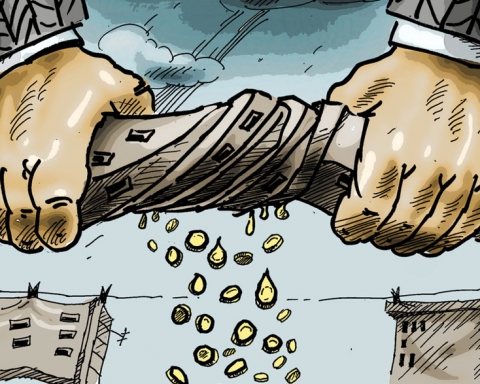The already familiar, but still very non-transparent ANIF foundation, in 2022 allocated a whopping 7 million dollars of taxpayer money to a mysterious enterprise called “Amber Capital Armenia”. Ostensibly, this investment was made as a means to bolster the Armenian economy. The suspicious nature of this company is twofold.
The first mystery arises from the fact that ANIF itself was established to make such, and has amassed a team with hefty salaries, yet it opted to outsource its activities.
The second revolves around the nature of Amber Capital to warrant such a substantial investment of taxpayer money. what kind of company was Amber to be able to get such a sum of taxpayers’ money?
Founded in 2013, by three foreigners, the company’s website, www.ambercapital.am features a lone photo of the city of Porto. Until 2020, the company laid dormant, only to rebrand itself as the manager of the “EU-Armenia SME Fund”, a $60mln fund registered in Luxembourg for investments in small and medium-sized businesses. Notably, $7mln of taxpayer funds were injected into the fund, along with an additional $15mln through pension funds Amundi-Acba and C-Quadrat, where the entirety of Armenians’ pension savings are accumulated.
This is the capital under Amber Capital’s management.
However, the company itself operates as a subsidiary of a London-based investment firm, led by one Joseph Oughourlian, who also holds a position in the AGBU Council and frequently meets with the Armenian Prime Minister. Strangely enough, the website of Amber Capital UK contains various images, and emotionally charged language, yet it lacks any specifics or reports regarding its activities and investments.
It is important to note here, that Amber Capital operates in Armenia without a license, evades scrutiny from the central bank, and refrains from publishing any reports detaining the whereabouts of taxpayers’ funds. Nevertheless, it continues to rake in compensation for its capital management services.
Much like ANIF, ARFI, and E+S funds, the destination of our funds, their management, performance, and accountability are shrouded in mystery. Yet, the government funneled $7mln to Amber Capital two years ago, with the subsequent fate of these funds remaining unknown.
Another noteworthy point is that while the government may presume that the $7mln allocated for investments in small businesses will contribute to the country’s development, with potential indirect benefits, it is still unclear what drives these two pension funds. Their primary concern should lie in safeguarding our pension savings and securing an acceptable rate of return. However, reconciling these divergent goals within a single fund presents a challenge.
Of the disclosed investments, $3mln went to Vardanants clinic, $3mn to walnut production, $3mn to solar energy, and an unspecified sum to SIS juice producer and ACX cryptocurrency platform.
The presence of small businesses in this mix is dubious at best. But the pressing question remains: what is the future of these investments? How do these businesses operate and how does Amber Capital oversee them? Will there be a meaningful return on investment?
Curiously, why aren’t pension funds, entrusted with our savings, raising pertinent questions?
Only one investment offers some semblance of clarity. The company “Solis” allegedly operated in the energy sector, with the foundation acquiring a 100% stake in the company. However, details regarding the investment amount and outcomes remain unknown. Currently, Solis is a dormant entity, with a single employee and no activity.
In essence, Amber Capital dispenses state money akin to state funds themselves yet fails to provide any account of results or even disclose the destination of taxpayer funds.
What’s even more troubling is that the new Minister of Economy’s interactions with Amber’s management seemingly condone this malfeasance. This echoes the concerning pattern of the owners cozying up to government members.
In this precarious scenario, we aren’t just losing our hard-earned tax money, but also jeopardizing our pension savings meant to secure our senior age in 15-20 years.
—-
Levon Khalatyan






